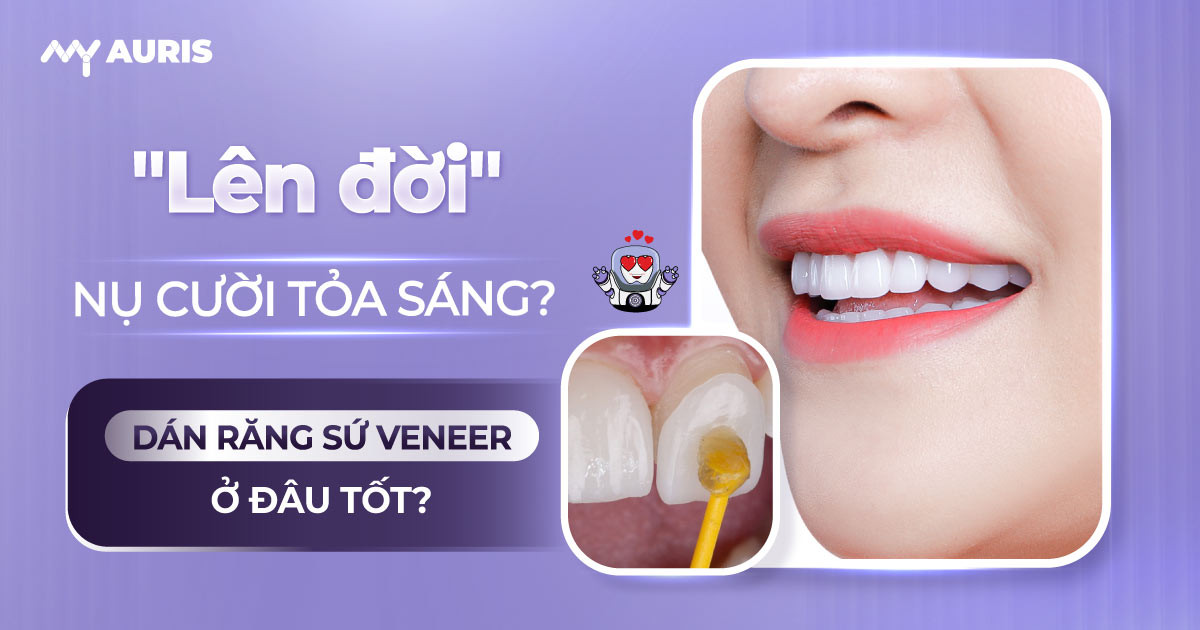Do you want to have a radiant smile with bright, white, beautiful teeth? Porcelain dental veneers are the optimal aesthetic solution, but choosing a reputable dentist is extremely important. This article will guide you on how to find a reputable dentist to perform porcelain veneers, and also provide information about the process, costs and notes you need to know.
Where is a good place to get porcelain veneers?
When looking for a reputable place for porcelain veneers, you should pay attention to a number of important criteria to ensure service quality and safety for oral health. First of all, the doctor needs to have high experience and expertise, with clear certificates to effectively perform porcelain veneers. Next, modern facilities and medical equipment that meet hygienic standards are necessary conditions to help the process take place accurately and safely. Furthermore, dentistry uses advanced technology such as CAD/CAM and digital photography to improve treatment effectiveness. Reviews and feedback from customers are also valuable sources of information for you to consider service quality. Finally, you should choose a dentist with a reasonable price, and at the same time pay attention to other factors to avoid incurring costs.
Factors to choose a reputable dentist
Below are important criteria to help you make a wise decision when choosing a dentist to perform porcelain veneers:
Doctor’s experience and expertise
A highly experienced and specialized doctor is the most important factor. You should learn about the doctor’s professional qualifications, practice experience and certificates. An experienced doctor will clearly understand tooth structure, porcelain bonding techniques and be able to provide appropriate solutions for each specific case.
Modern facilities
Facility Modern facilities are a necessary condition to ensure service quality. You should choose a dentist with modern medical equipment that meets hygiene and safety standards. Advanced equipment helps doctors perform the porcelain bonding process accurately, effectively and safely.

Using advanced technology
Advanced technology in dentistry plays an important role in improving the efficiency and accuracy of the porcelain bonding process. You should learn about dentistry that applies advanced technologies such as:
- CAD/CAM technology: Supports the design and manufacture of precise porcelain teeth, ensuring close fit and aesthetics.
- Digital imaging technology: Helps doctors accurately grasp tooth condition and easily plan appropriate treatment.
- Bactericidal technology: Ensures a sterile, safe environment for patients.
Customer reviews and feedback
Customer reviews and feedback are valuable sources of information for you to evaluate the quality of dental services. Look for information on social networking sites, forums, dental websites or ask for opinions of people who have used the service there.
Reasonable price
Service cost is a factor to consider prompt. However, one should not rely only on price and ignore other factors. You should choose a dentist with a reasonable price, suitable for your ability to pay. It is necessary to carefully learn about the price, included services, and warranty to avoid additional costs.
Porcelain Veneer Procedure
The porcelain veneer procedure is an effective cosmetic solution that helps improve color and shape. shape and evenness of teeth. First, the doctor will examine and advise on your oral condition and choose the appropriate type of porcelain. The tooth is then cleaned and ground to create space for the veneer. Next, the doctor takes tooth impressions to make veneers in the lab. After checking the quality of the veneer, the doctor will try it on the tooth to make adjustments before fixing it with specialized glue. Finally, patients are instructed to care for their porcelain teeth to maintain their shine and beauty.
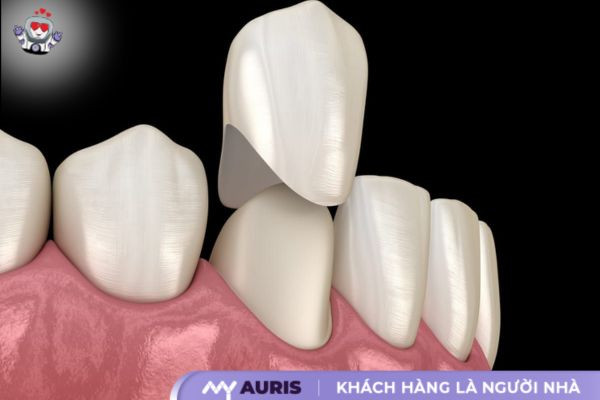
What are porcelain dental veneers?
Porcelain dental veneers is a technique that uses thin pieces of porcelain (veneer) made in the appropriate shape and color to paste onto the surface.Real tooth surface, helping to improve the aesthetics and durability of teeth. This method is commonly used to correct defects such as: yellow teeth, gapped teeth, chipped teeth, chipped teeth, slightly misaligned teeth…
Benefits of porcelain veneers:
- High aesthetics: Porcelain veneers help improve the color, shape and evenness of teeth, bringing a radiant and confident smile.
- Good durability: Porcelain veneer teeth are made from high-quality ceramic material, have high durability, good bearing capacity and are resistant to abrasion.
- Painless: The process of applying porcelain veneers is done quickly, gently, and without causing pain to the user.
- Fast implementation time: It only takes about 1-2 sessions to complete the porcelain veneer process, helping you save time and effort.
- Reasonable cost: The cost of porcelain veneers is suitable for many customers, helping you have a beautiful smile without having to spend too much money.
The porcelain veneer process is carried out in 5 main steps:
Step 1: Dental Examination and Consultation
- Dental examination: The dentist will check your oral health, evaluate the suitability of porcelain veneers, and identify problems that need to be resolved before proceeding with dental veneers.
- Consultation: The doctor will advise on the type of porcelain teeth, color, shape suitable for your face, wishes and financial ability.
- Material selection: The doctor will advise on types of ceramic: Ceramill ceramic, E-max ceramic, Zirconia ceramic… for you to choose to suit your needs and economic conditions.
Step 2: Standard Teeth
- Teeth cleaning: The doctor will thoroughly clean your teeth to remove plaque and tartar, making the tooth surface clean and easy to shape.
- Tooth grinding: To create space for the veneer to be glued in, the doctor will grind a thin layer of enamel on the surface of the real tooth. The amount of enamel ground will depend on the thickness of the veneer.
- Taking pictures of teeth: The doctor will take pictures of teeth to compare and monitor the results after tooth bonding.
Step 3: Take Dental Impressions
- Taking dental impressions: The doctor will use specialized impression materials toshaping the tooth mold.
- Send tooth impressions for veneer fabrication: The tooth mold will be transferred to the lab so that the technician can fabricate the veneer according to the designed shape and color.
Step 4: Making Porcelain Teeth
- Veneer fabrication: Technicians use modern CAD/CAM technology to fabricate veneers according to the impression of teeth.
- Checking the veneer: The doctor will carefully check the veneer before applying it to the teeth.
Step 5: Porcelain Dental Paste
- Testing the veneer: The doctor will try the veneer on the tooth to check the fit, color and shape before placing it in place.
- Veneer application: The doctor will use specialized glue to apply the veneer to the surface of the real tooth.
- Edit: The doctor can adjust the veneer to suit the mouth and create a naturally beautiful smile.
- Finish: After applying veneers, the doctor will instruct you on how to care for your porcelain teeth to keep them shiny and durable.
Cost of Porcelain Dental Veneers Veneers: A Detailed Guide for You
Are you looking for a solution to have a brighter, more confident smile? Porcelain dental veneers are one of the most popular dental cosmetic methods today. However, to make the right decision, you need to clearly understand the cost of porcelain veneers.
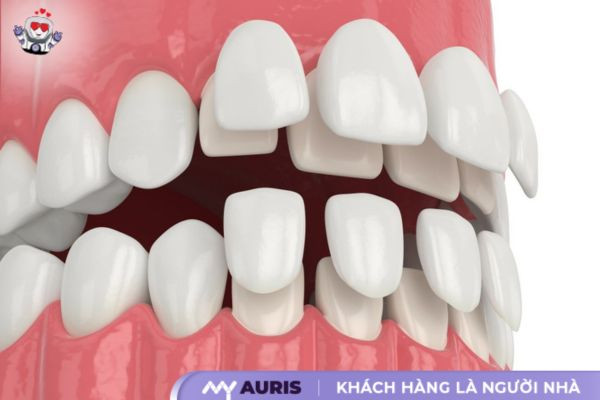
Factors Affecting Cost
The cost of porcelain veneers depends on many factors, including:
- Ceramic teeth material: Porcelain teeth are made from many different materials, each with its own characteristics and price.
- Metal ceramic teeth: This type of ceramic tooth has the lowest price but is less durable and easily discolored.
- All-ceramic porcelain teeth: This type of porcelain teeth hasHigher price but high durability, natural color, does not change color over time.
- Zirconia porcelain teeth: This type of porcelain teeth has the highest durability, beautiful natural color, and highest price.
- Dentists perform: Service costs of each dental clinic may vary depending on the scale, equipment, and professional qualifications of the doctor.
- Location: Service costs in big cities are often higher than in rural areas.
- Number of teeth to be bonded: The more teeth to be bonded, the higher the cost.
Advice for you:
- Learn carefully about porcelain tooth materials, the advantages and disadvantages of each type to choose the one that suits your needs and financial ability.
- Consult dental experts for advice on choosing a reputable dentist and appropriate methods.
- Compare price lists of dental clinics to find the best price.
The benefits of porcelain veneers
Do you want to have a radiant, confident smile with bright, white teeth? Porcelain dental veneers are a cosmetic dental solution that many people are choosing. But do you know what benefits porcelain veneers bring? Let’s learn about the outstanding advantages of this method to make the most suitable decision for yourself!
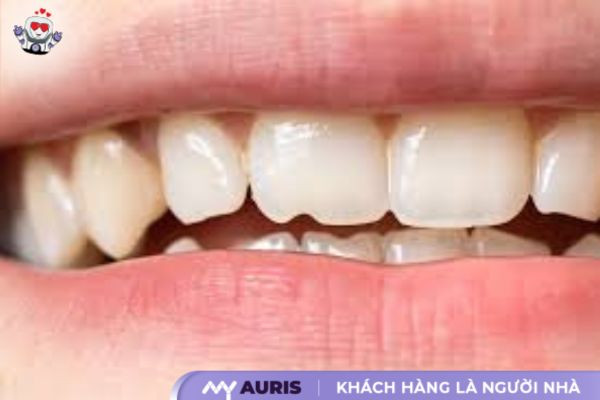
Aesthetics high
Porcelain dental veneers are considered the leading dental aesthetic solution today. Using a thin layer of porcelain to cover the tooth surface, veneer helps overcome all defects such as yellow teeth, gap teeth, chipped teeth, misaligned teeth,… giving you bright, white, even teeth and a radiant smile.
Veneers can:
- Change color: Porcelain veneers are produced in many different colors, helping you choose the color that suits your skin tone and preferences, bringing a radiant, natural smile.
- Change shape: Veneers can correct tooth shape, create thickness and curvature for teeth, and correct defects such as chipped teeth, gapped teeth, and misaligned teeth.
- Create a natural effect: Veneers are designed according to the shape and color of real teeth, creating a natural effect, not feeling like fake teeth.
Good durability: smile durable over time
Porcelain is a hard, abrasion-resistant, color-resistant material, helping veneer to last over time. With proper care, veneer can last 10 to 15 years, or even more.
Advantages of veneer durability:
- Abrasion resistance: Porcelain is a hard, durable material that resists abrasion well, helping the veneer retain its original shape and color for a long time.
- Anti-staining: Porcelain does not easily stain like real teeth, helping the veneer stay shiny and clean white.
- Anti-bacterial: Porcelain is a waterproof material that prevents bacteria from penetrating, helping to protect teeth from infection.
Doesn’t cause pain: comfortable smile
Porcelain dental veneers are a painless tooth cosmetic method, because the doctor uses professional tooth grinding techniques, anesthetic injections and modern equipment. You can be completely assured of a painless feeling during the veneering process.
The veneering process takes place as follows:
- Dental examination and consultation: The doctor will examine your teeth, determine your oral condition and advise on the appropriate veneer method.
- Teeth preparation: The doctor will gently grind the teeth, creating a tooth framework for the veneer. This step is performed under anesthesia, causing no pain to you.
- Taking tooth impressions: The doctor will take tooth impressions to create a veneer that fits your teeth.
- Making veneers: Veneers are made from porcelain that follows the impression of your teeth.
- Veneer application: Veneers are glued to the teeth with specialized medical glue, which does not cause irritation.
Fast implementation time: the smile shines immediately immediately
Porcelain veneers have a quick implementation time, from 1 to 2 sessions depending on the number of teeth that need to be bonded. You can have a bright smile immediately after applying veneers.
Benefits of veneer implementation time:
- Time savings: Compared to other cosmetic methods, veneer application has a quick implementation time, helping you save time and effort.
- Quick results: You can see the effectiveness of veneers immediately after completion.
Reasonable cost: classy smile for everyone
The cost of porcelain veneers depends on the ceramic material, tooth bonding technique and place of implementation. However, compared to other cosmetic methods such as porcelain dental implants, braces, the cost of veneers is often lower, suitable for many people.
Factors affecting the cost of veneers. veneer:
- Porcelain material: Porcelain has many types with different prices, from ordinary porcelain to high-end porcelain.
- Tooth bonding technique: Modern, professional tooth bonding techniques will have a higher price.
- Place of execution: Reputable dentistry with modern facilities will have a higher price.
Limitations of Porcelain Veneers
Porcelain dental veneers are a popular dental cosmetic method, helping to improve the smile quickly and effectively. However, like all other cosmetic methods, porcelain dental veneers are also available There are certain limitations that you need to keep in mind before deciding to do it.
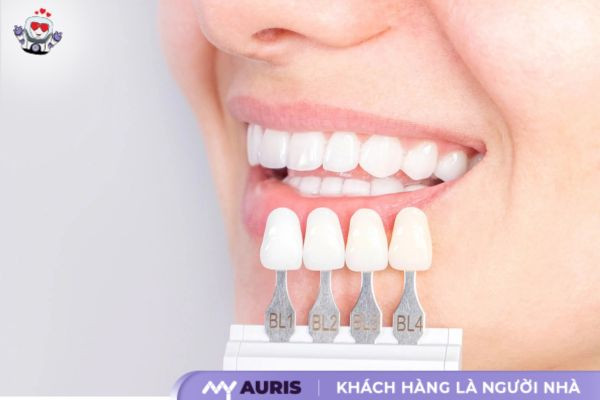
Not Suitable for Bad Teeth
Porcelain veneers are not the right solution for all cases. If your teeth are severely damaged, such as severe tooth decay, periodontitis or broken teeth, veneers are not suitable for all cases. may not bring the desired effect.
In these cases, you should consider other tooth restoration methods such as fillings, porcelain crowns or dental implants.
YesCan Cause Sensitivity
After applying veneers, some people may experience sensitivity to temperature or sensitivity when eating and drinking. This is because the tooth enamel layer is ground away, making the teeth more sensitive to external stimuli.
This condition will usually go away after a few weeks, but if the sensitivity persists, you should contact your dentist for examination and treatment.
Need Proper Oral Care
After applying veneers, you need to take careful care of your teeth to ensure the durability and aesthetics of your teeth. Daily oral hygiene, using dental floss and avoiding eating hard foods will help protect porcelain veneer teeth and prolong their lifespan.
In addition, you should also have regular dental check-ups so that the dentist can check the condition of your teeth and promptly handle any problems that arise.
How to care for porcelain veneer teeth to maintain durability and high aesthetics
Have you just had porcelain veneers done to have a brighter and more confident smile? Surely you want to Keep your new porcelain teeth always beautiful and long lasting. Proper care of porcelain veneer teeth is an important key to achieving this. Let’s learn simple yet effective secrets to keep your porcelain teeth bright, healthy and beautiful as new.
Brush your teeth properly
Brushing your teeth is the first and also important step. The most important thing in taking care of porcelain veneer teeth. Brushing your teeth properly helps remove food scraps, plaque and bacteria, protects porcelain teeth from yellowing and discoloration and keeps your smile bright.
- Choose a soft toothbrush: A soft bristle toothbrush will gently clean the surface of porcelain teeth without causing scratches, affecting the durability of porcelain teeth.
- Use toothpaste for porcelain teeth: You should choose toothpaste that contains fluoride and does not contain strong whitening agents.
- Brush your teeth twice a day: Will help effectively remove leftover food and bacteria on the surface of porcelain teeth, keeping teeth clean and shiny.
- Brush your teeth with the correct technique: Brush your teeth in light circular motions, focusing on the interdental spaces and gum areas.
Use dental floss
Dental floss is a powerful support tool that helps you remove food scraps and plaque stuck deep in between your teeth, places that are difficult to reach with a toothbrush.
- Floss every day: Take time to floss after brushing your teeth to ensure optimal oral hygiene.
- Floss technique: Thread gently floss between teeth, moving up and down in a C shape, avoid moving vigorously or pulling the floss horizontally.
- Choose the right type of dental floss for your porcelain teeth and avoid using dental floss that contains abrasive particles.
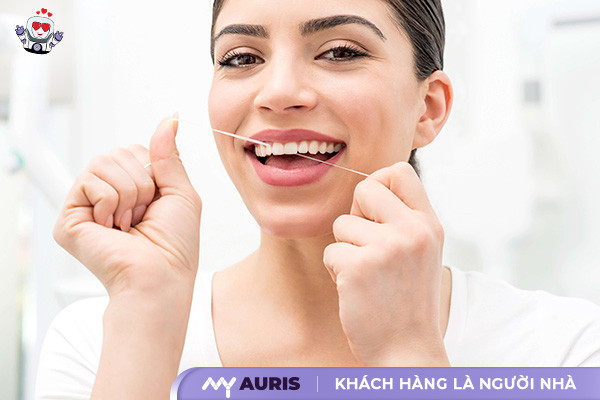
Avoid eating hard foods
Ceramic veneer teeth are very hard and durable but can still break if you chew hard foods too much.
- Limit eating hard foods: Avoid chewing hard nuts, hard candy, animal bones, too chewy foods, etc.
- Cut food into small pieces before chewing: Cutting food into small pieces before chewing helps reduce the impact force on teeth. Porcelain, protects porcelain teeth from cracking.
- Chew thoroughly: Chewing food thoroughly helps reduce impact force on porcelain teeth, and helps with better digestion.
Go for regular dental check-ups
Regular dental check-ups at the dentist are extremely important, helping to detect potential dental problems early and promptly treat them, keeping your porcelain teeth healthy.
- Regular check-ups every 6 months: Create a habit of checking your teeth periodically at the dentist at least every 6 months so that the doctor can examine, clean your teeth, evaluate the condition of your porcelain teeth and give appropriate care advice.
- If you have any problems with porcelain teeth, go to the dentist for timely examination and treatment by a doctor.
You have learned thoroughly about porcelain veneers, the benefits, limitations and care. The next step is to choose a dentist. Reputable to perform the service. Prioritize dentistry that has professional doctors, modern facilities, uses advanced technology and receives positive reviews from customers with the motto “Customers are family”, so choose a dentist that respects and cares about your health, and is committed to providing quality service.ng at a reasonable price.
Thu Lieu


